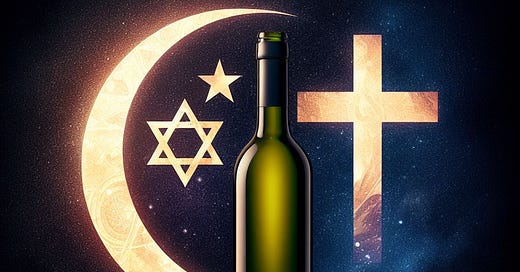Wine and the Clash of Civilizations
A devotion to moderation vs prohibition explains a good deal
I’ve never paid much attention to how the Abrahamic religions treat wine. I’ve repeated the Kiddush at Shabbat. I know the story of Jesus and the wedding at Cana. But I’ve really not given a great deal of thought to the subject. And yet, the disposition of Christianity, Judaism, and Islam toward wine and alcohol in general has a great impact on people’s lives. There are both subtle and enormous differences between these faiths.
“Truly [God] has cursed [alcohol] and has cursed the one who produces it, the one for whom it is produced, the one who drinks it, the one who serves it, the one who carries it, the one for whom it is carried, the one who sells it, the one who earns from the sale of it, the one who buys it, and the one for whom it is bought.
Scholar Ibn Kathir
“Go, eat your food with gladness, and drink your wine with a joyful heart, for God has already approved what you do.”
Ecclesiastes 9:7
“Blessed are You, God, Ruler of the universe, who creates the fruit of the vine.”
The Kiddush
These are representative of the same God, dictated through different messengers and different religions. If I had to pick, I’d say Ecclesiastes is more my cup of tea.
It has been said by many of late, given the war Hamas provoked and the powerful response from Israel, that we are experiencing a “Clash of Civilizations”. On the one hand, this sounds like a trite phrase. In fact, the phrase was most completely articulated, and its meaning was best teased out by historian Samuel Huntington in his mid-90s book, “The Clash of Civilizations and the Remaking of the World Order.”
Huntington argues that in the wake of the end of the Cold War, the world will revert back to one in which cultures, rather than ideology, are the primary causes of conflict in the world with the West being challenged by previous cultures that had experienced colonialism imposed by the West.
I’ve argued that wine is a thing of the West; a signifier of Western Civilization; and one of the many positive aspects of Western Civilization. So, it is no surprise to me that when considering this “clash of civilizations” we see that wine is part of the cultural clash. Or at least wine and its position within the culture of the West and of Islam helps define those two cultures.
Huntington carves the world into nine broadly defined cultures: Western Civilization, Orthodox, Latin American, Islamic, Hindu, Japanese, African, Sinic, and Buddhist. Of these, only the Islamic civilization strictly forbids the consumption of alcohol. The others embrace it to one degree or another and generally counsel moderation.
In the clash between the West and Islam, wine is but one dividing point, but it is a stark one at that. Israel possesses a thriving wine industry. And of course, the rest of the West and its many outposts are the centers of wine culture. Islam has no use for alcohol. Believers in Islam are instructed that the prophet revealed:
When an adulterer commits illegal sexual intercourse, then he is not a believer at the time, he is doing it, and when a drinker of an alcoholic liquor drinks it, then he is not a believer at the time of drinking it, and when a thief steals, then he is not a believer at the time of stealing, and when a robber robs, and the people look at him, then he is not a believer at the time of doing robbery.
The consumption of alcohol is said to be akin to the practice of adultery, theft, robbery, and a denial of the faith.
What’s notable about the relationship between the West and alcohol, and particularly wine, is the emphasis on moderation we see in its sacred texts. The Bible, while glorifying wine, also cautions in numerous places to avoid drunkenness. The sacred Jewish texts differ hardly at all from the Bible in their glorification of wine and urging toward moderation.
Thinking about the current “clash”, it is striking to me how the idea of moderation is key in understanding these cultural combatants. Massacre vs. constraint. Genocidal ends vs. protective ends. Hostage vs. Prisoner. And of course, Prohibition vs moderation.




